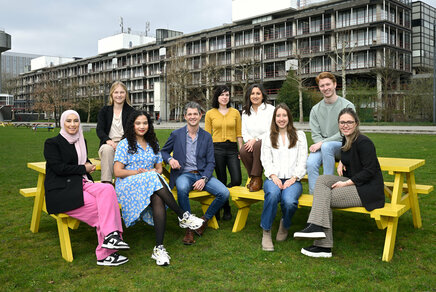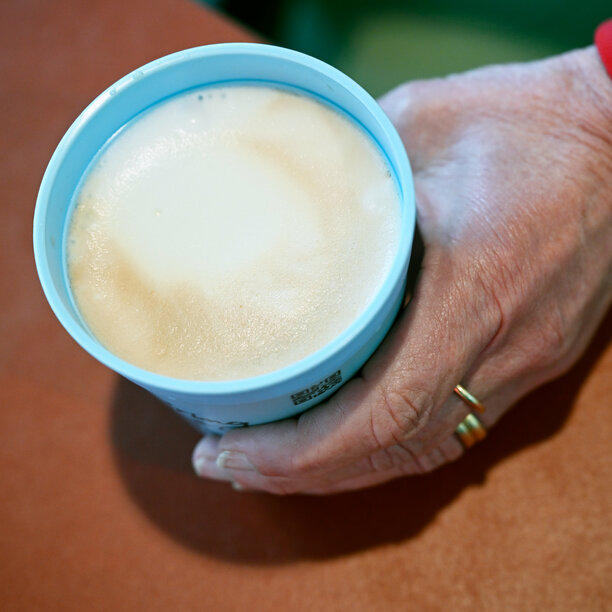How coffee is getting greener at TU/e
New sustainable coffee and vegan options, no more disposable cups.
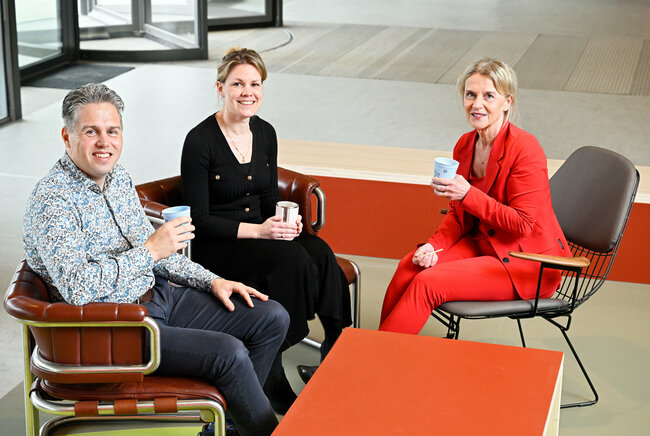
More than a year of thorough preparation preceded the 108 new coffee machines with sustainable coffee and tea, which the company Maas will be installing in the buildings on our campus over the next three weeks. Jeroen Zegveld, Bregje Portier-Van der Steijn and Bertie Fijneman were the drivers behind the sustainable procurement of our daily (and indispensable) portion of caffeine. The biggest changes: new sustainable coffee, tea bags instead of automatic tea, 11 vending machines with vegan oat milk and the disappearance of disposable cups.
The 124 machines on the TU/e campus brewed a total of around one and a half million cups of coffee, tea or hot chocolate in 2021. One could conclude that coffee is an important necessity of life for academics and students. Research and education run on the daily shot of caffeine, tapped from one of our campus’ many vending machines. “Coffee is a primary need,” agrees Bregje Portier-Van der Steijn. In her role as a policy officer at the Facility Management Center, she helped to evaluate coffee suppliers according to sustainability.
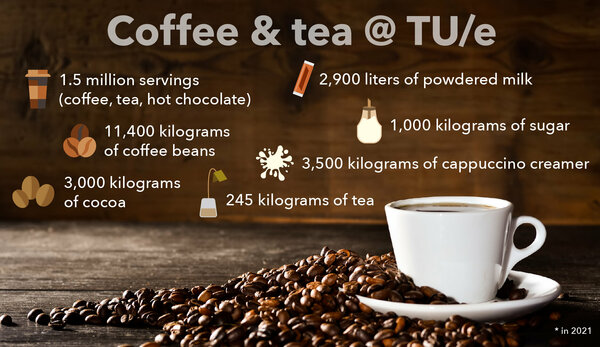
Our current coffee supplier Maas came out on top after an extensive tender process and will remain the purveyor of the black gold to our campus for the next 12 years. “There’s also room in the contract to periodically adjust the choice of coffee beans,” says Jeroen Zegveld, strategic purchaser at Finance & Control. “The previous coffee tender expired on May 1, 2023. As a purchaser, I sounded the alarm that we needed to set up a new tender. That takes a lot of time, which is why we started preparations in early 2022.”
Specific requirements
“Sustainability has always been part of tenders, but it has become even more important since a central policy was introduced to procure sustainably,” Zegveld says. “In the previous tender, companies that tendered had to have a sustainability certificate. In the meantime, our requirements have become a bit more specific: we want to know exactly where the coffee comes from, what the CO2 emissions of its production are, what the working conditions of the workers are like, et cetera. For this project, we had a team of three people assessing sustainability, including a student from the Go Green Office. Sustainability is no longer something we do ‘on the side’; it takes the lead and comes from within ourselves.”
“Sustainability is now an important criterion; it was weighted at 40% in the choice of coffee supplier,” Zegveld continues. Six sustainability themes have been looked at: environment, climate, supply chain responsibility, innovativeness, circularity and social sustainability.
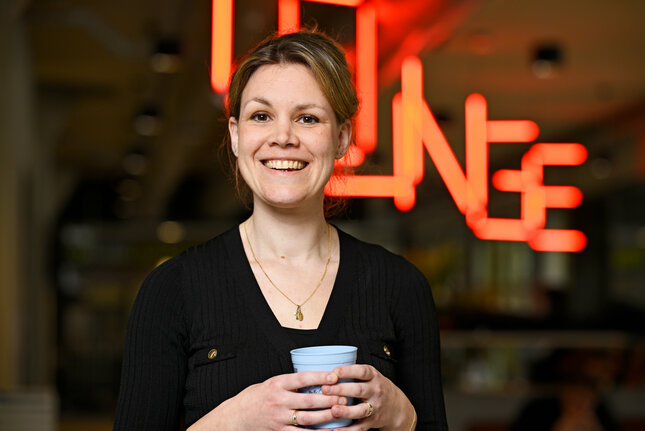
Our coffee supplier Maas is in the top four most sustainable companies in the Netherlands. We certainly selected them for that.
Bregje Portier, policy officer Facility Management Center
Homeless
Portier elaborates: “Maas offered three different coffee beans, each focusing on a different aspect of sustainability. With Blendstar, for example, supply chain responsibility plays a big role. This coffee comes from Ethiopia and is roasted and packaged there; the entire chain takes place there. With Optimist coffee, the emphasis is on social responsibility. Their coffee is roasted by homeless people in Eindhoven. And the beans of Circle of Beans score well on circularity because they are roasted on biogas made from coffee grounds and packaged in reusable buckets. So, they are all sustainable in their own way.”
For two days in late February, the TU/e community got to taste the three coffees and help choose one. 584 of them voted for their favorite and Blendstar was eventually chosen for the regular machines. In the three upscale coffee stations in Gemini, MetaForum and Flux, Morgen will be served (during the test, this coffee was called Optimist). In addition, a vegan coffee machine will appear in all major buildings with the option of oat milk for the same price (55 cents). “Because we think it’s important that people can make sustainable choices without looking at the cost,” says Portier-Van der Steijn.
Away with the disposable cup
The new coffee machines will no longer provide disposable cups. There will be mugs in the pantries of the buildings and there will be a standalone vending machine in the Auditorium where you can buy a reusable Billie Cup for one euro. Billie Cups will also be available in the snack vending machines in the various buildings.
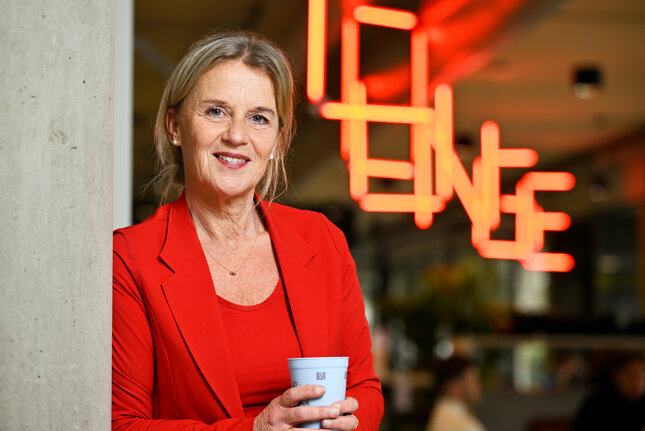
We are pioneers in doing away with disposable cups. Other parties are watching how we are doing this with interest.
Bertie Fijneman, facility services coordinator at the Facility Management Center
“On January 1, 2024, a nationwide ban will be introduced on the use of disposable cups. TU/e is anticipating the legislation by abolishing them now,” says Bertie Fijneman, project leader of this tender on behalf of the Facility Management Center. “The introduction of the new vending machines is a great moment in this.”
New law
Every year, 19 million disposable plastic cups are used in the Netherlands. This new law, which will take effect in 2024, has been created to prevent plastic from ending up in the sea and to bring about a change in the disposable culture.
“It’s exciting, though,” says Portier-Van der Steijn. “Discussions will take place on which is more sustainable: disposable cups or washable cups. Generally speaking, reuse is better for the environment. In that case, you have to use the cup several times before you wash it.”
Fijneman: “You know that this is going to generate resistance because it’s a change. But you can also be proud of your university for doing this.” “And hey, the world won’t end,” jokes Zegveld. “It does without coffee,” replies Portier-Van der Steijn.
Bring your own
“Our community is growing more and more accustomed to having to bring their own cups. All pantries will have tea glasses and mugs and, at meetings with guests, Billie Cups will be available for sale in the vending machines or, during opening hours, in the canteens. We are a pioneer in this respect, but everyone will have to face it come January,” says Fijneman. “We have started a communication campaign to make people aware that the paper cups are on their way out.”
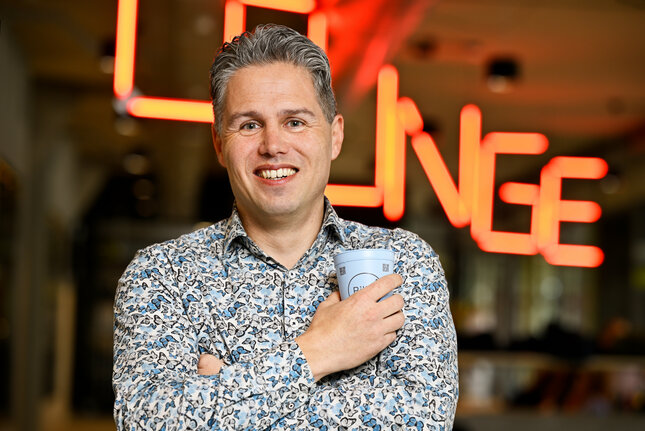
What coffee lovers consider to be really good coffee is so personal. For vending machines, you actually need a crowd-pleaser.
Jeroen Zegveld, strategic purchaser, Finance & Control
Tea drinkers
Tea drinkers are also being catered to with six different sustainable tea varieties, Fijneman explains. “The machines have a special supply for hot water, so no more tea that tastes like coffee. And the machines have three water temperature options for tea. Black, green and white tea all require a different temperature.”
Fewer vending machines
The new vending machines are smaller, can preventively report failures and are built modularly so that when problems arise, parts can be replaced rather than the entire machine. And they have become simpler in that they no longer have a cup dispenser. “It always dispenses coffee, even if there’s no cup underneath,” Fijneman says. “That’s bound to go wrong at some point, but it’ll only happen to you once.”
The number of vending machines will be slightly reduced from 124 to 108. “We heard from the market that we have too many machines, but we have ensured that there is at least one machine in every building on campus,” assures Zegveld. “It’s not okay to have to walk half a kilometer for a cup of coffee,” adds Fijneman.
Zegveld concludes: “Coffee is important to our community: it provides a sense of hospitality and allows people to come together."
More on our strategy

![[Translate to English:] [Translate to English:]](https://assets.w3.tue.nl/w/fileadmin/_processed_/c/f/csm_BvOF_2024_0319_AEV_license_TUe_Dirk_van_Meer_-_CORE_1__c976e259a5.jpg)
